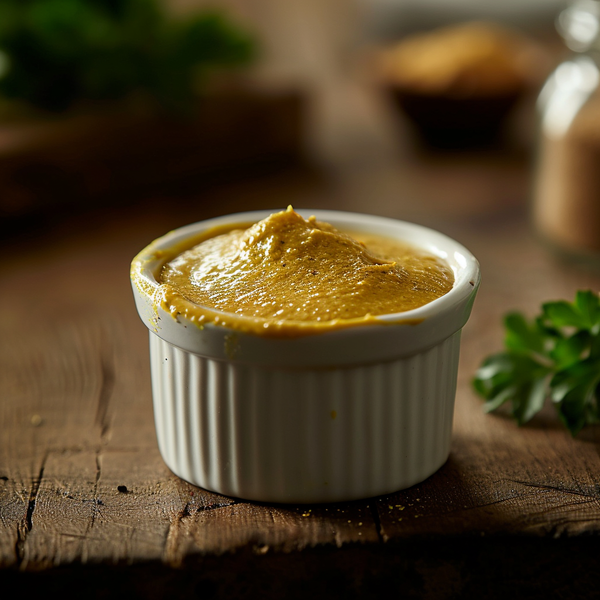
Dijon Mustard
Dijon mustard, originating from the city of Dijon in Burgundy, France, is a creamy, smooth mustard made from brown or black mustard seeds, white wine or wine vinegar, water, and seasonings. It's known for its tangy, sharp, and somewhat spicy flavor, making it a versatile ingredient in cooking. Here's how Dijon mustard is commonly used:
Salad Dressings and Vinaigrettes:
Dijon mustard is a popular emulsifying agent in salad dressings and vinaigrettes, helping to blend oil and vinegar together for a creamy texture. Its tanginess adds depth to the dressings.
Marinades:
It's used in marinades for meat, poultry, and fish, adding flavor and helping to tenderize the protein. Dijon mustard's acidity and spices penetrate the meat, enhancing its taste and moisture.
Sauces and Condiments:
Dijon mustard is a key ingredient in many sauces, including classic French sauces like Hollandaise and Béarnaise. It's also used to enhance the flavor of mayonnaise, aioli, and remoulade.
Glazes:
A glaze made with Dijon mustard can be brushed onto meats, poultry, and fish before roasting or grilling, adding a tangy flavor and aiding in caramelization.
Sandwich Spreads:
Dijon mustard is often spread on sandwiches and burgers to add a spicy, tangy element that complements meats and cheeses.
Meatloaf and Meatballs:
A spoonful of Dijon mustard can be mixed into ground meat preparations like meatloaf and meatballs to enhance their flavor and moisture.
Dips:
It can be incorporated into dips and spreads, adding a tangy kick that pairs well with pretzels, vegetables, and chips.
Potato and Pasta Salads:
Dijon mustard adds a flavorful twist to potato and pasta salads, providing a creamy consistency and a sharp taste that balances the starchiness of the potatoes or pasta.
Roasted Vegetables:
Tossing vegetables with a bit of Dijon mustard before roasting can add a flavorful crust and enhance the natural sweetness of the veggies.
Baking:
Dijon mustard can be brushed onto pastry-wrapped dishes, like beef Wellington, or used in the dough of savory pastries to add a subtle, tangy flavor.
When using Dijon mustard in cooking, its potent flavor should be balanced with other ingredients. A little goes a long way, and it can be adjusted according to taste preferences. Dijon mustard is not just a condiment but a valuable cooking ingredient that can elevate a wide range of dishes with its unique taste.
Nutritional Information
carbohydrates
7.78 g
fats
3.11 g
protein
3.95 g
calories
66